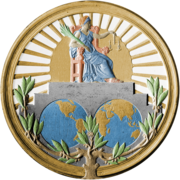| Legal Consequences arising from the Policies and Practices of Israel in the Occupied Palestinian Territory, including East Jerusalem | |
|---|---|
 | |
| Court | International Court of Justice |
| Full case name | Legal Consequences arising from the Policies and Practices of Israel in the Occupied Palestinian Territory, including East Jerusalem (Request for Advisory Opinion) |
| Started | 2023 |
| Keywords | |
Legal Consequences arising from the Policies and Practices of Israel in the Occupied Palestinian Territory, including East Jerusalem, was a proceeding before the International Court of Justice (ICJ), the highest legal body of the United Nations (UN), stemming from a resolution adopted by the United Nations General Assembly (UNGA) in December 2022 requesting the Court to render an advisory opinion relating to the legality of the Israeli occupation of the Palestinian territories.[1]
Israel has occupied the Palestinian territories, which comprise the West Bank (including East Jerusalem) and the Gaza Strip, since 1967, making it the longest military occupation in modern history.[2] In 2004, the ICJ delivered an advisory opinion on the Israeli West Bank barrier, deciding that it contravened international law and should be removed. In January 2023, the ICJ acknowledged the UNGA's request for an advisory opinion on the legal consequences arising from the Israel's policies and practices in the occupied Palestinian territories.[3][4]
Public hearings opened on 19 February 2024 at the ICJ's seat in The Hague,[5][6] with 52 states and three international organizations presenting legal arguments — the largest number of parties to participate in any single case in the ICJ's history.[7][8][2][9][10] The court's advisory opinion was delivered on 19 July 2024, determining that the Palestinian territories constitute one political unit and that Israel's occupation since 1967, and the subsequent creation of Israeli settlements and exploitation of natural resources, are illegal under international law. The court also ruled that Israel should pay full reparations to the Palestinian people for the damage the occupation has caused,[11][12] and determined that its policies violate the International Convention on the Elimination of All Forms of Racial Discrimination.[13]
The Palestinian Authority welcomed the decision as historic,[14] while the Israeli government formally rejected it, stating a political settlement can only be attained through negotiations; Israeli leaders and politicians further decried the ruling as antisemitic.[14] The court's opinion was backed by the European Union[15] but criticized by the United States.[16] The matter will be returned to the UNGA to decide next steps.
- ^ "What's the ICJ case against Israel's illegal occupation of Palestine?". Al Jazeera. 19 February 2024. Archived from the original on 20 July 2024. Retrieved 23 July 2024.
- ^ a b "Israel must end its occupation of Palestine to stop fuelling apartheid and systematic human rights violations". Amnesty International. 19 February 2024. Archived from the original on 18 July 2024. Retrieved 14 July 2024.
- ^ "World Court says it has received U.N. request for opinion on Israel occupation". Reuters. 20 January 2023. Archived from the original on 23 March 2023. Retrieved 27 October 2023.
- ^ "Press Release No. 2023/4: The General Assembly of the United Nations requests an advisory opinion from the Court in its resolution A/RES/77/247 on "Israeli practices affecting the human rights of the Palestinian people in the Occupied Palestinian Territory, including East Jerusalem"" (PDF) (Press release). International Court of Justice. 20 January 2023. Retrieved 27 October 2023.
- ^ "No. 2023/55: Public hearings to open on Monday 19 February 2024" (PDF) (Press release). International Court of Justice. 23 October 2023. Archived (PDF) from the original on 23 October 2023. Retrieved 28 October 2023.
- ^ "World court to hold public hearings over consequences from Israel's occupation". Reuters. 23 October 2023. Archived from the original on 23 October 2023. Retrieved 23 October 2023.
- ^ "Legal Consequences Arising from the Policies and Practices of Israel in the OPT (Request for Advisory Opinion) – Public hearings schedule 19 to 26 February 2024 – ICJ Press Release". Archived from the original on 20 April 2024. Retrieved 13 February 2024.
- ^ Third Hearing: ICJ on Israeli Policies in Occupied Palestinian Territories. United Nations. Archived from the original on 22 February 2024. Retrieved 22 February 2024 – via YouTube.
- ^ Cite error: The named reference
AJ1was invoked but never defined (see the help page). - ^ "What's the ICJ case against Israel's illegal occupation of Palestine?". Al Jazeera. Archived from the original on 20 July 2024. Retrieved 22 July 2024.
- ^ 'Legal Consequences Arising from the Policies and practices of Israel in the Occupied Palestinian Territory, Including East Jerusalem:Advisory Opinion,' Archived 23 July 2024 at the Wayback Machine Unispal 19 July 2023 pp.6,73,79.
- ^ Ghousoon Bisharat,‘Israel always sold the occupation as legal. The ICJ now terrifies them’ Archived 24 July 2024 at the Wayback Machine +972 magazine 23 July 2024
- ^ Cite error: The named reference
Haaretzwas invoked but never defined (see the help page). - ^ a b Cite error: The named reference
ha1was invoked but never defined (see the help page). - ^ Cite error: The named reference
mee1was invoked but never defined (see the help page). - ^ Cite error: The named reference
:0was invoked but never defined (see the help page).